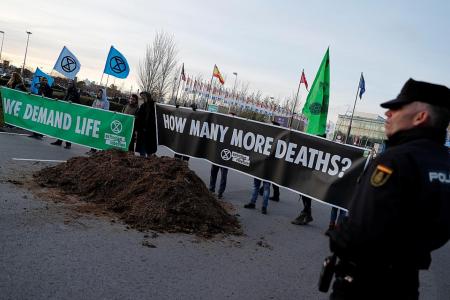Major states resist bold action to combat climate change
COP25 talks in Madrid end with criticism from smaller countries and environmental activists over major states' resistance to bolder action
MADRID: A handful of major states resisted pressure yesterday to ramp up efforts to combat global warming as a United Nations (UN) climate summit ground to a delayed close, prompting sharp criticism from smaller countries and environmental activists.
The COP25 talks in Madrid were viewed as a test of governments' collective will to heed the advice of scientists to cut greenhouse gas emissions more rapidly in order to prevent rising global temperatures from hitting irreversible tipping points.
But the conference, in its concluding draft, endorsed only a modest declaration on the "urgent need" to close the gap between existing emissions pledges and the temperature goals of the landmark 2015 Paris climate agreement.
"We are of mixed emotions," said Chile's Environment Minister Carolina Schmidt, who served as president of the talks.
Many developing countries and campaigners had wanted to see more explicit language spelling out the importance of countries submitting bolder pledges on emissions as the Paris process enters a crucial implementation phase next year.
RESISTANCE
Brazil, China, Australia, Saudi Arabia and the US had led resistance to bolder action, delegates said.
"These talks reflect how disconnected country leaders are from the urgency of the science and the demands of their citizens in the streets," said Ms Helen Mountford, vice-president for climate and economics, at the World Resources Institute think-tank. "They need to wake up in 2020."
The gathering had been due to end at the two-week mark on Friday but ran on for two extra days.
The final draft did acknowledge the "significant gap" between existing pledges and the temperature goals adopted in 2015.
Nevertheless, it was still seen as a weak response to the sense of urgency felt by communities around the world afflicted by floods, droughts, wildfires and cyclones.
The Pacific island of Tuvalu accused the USof blocking progress.
"There are millions of people all around the world who are already suffering from the impacts of climate change," Mr Ian Fry, Tuvalu's representative said.
"Denying this fact could be interpreted by some to be a crime against humanity." - REUTERS
Get The New Paper on your phone with the free TNP app. Download from the Apple App Store or Google Play Store now



